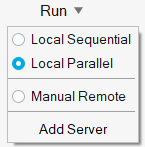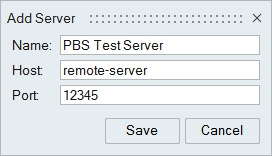Run Options: Local vs. Remote
Choose whether to run jobs locally or on a remote job server.
Run Options Menu
Click the Run group label to define how jobs are run.
Click the Run group label to define how jobs are run.

Add a Remote Job Server
Add and configure an Altair PBS server to run jobs remotely.
This option is only available for Structures and Print3D analysis, not Motion analysis.
-
Click the Run group label to display run options.

- Select the Add Server option from the menu.
-
Enter the Name, Host, and
Port.

-
Click Save.
A cloud icon appears next to the Run menu when the connection to the server has been established.

- Click the Run group label and verify that the server has been added.
- Set up and run an analysis using the Run Analysis window.
Note:
If Inspire is integrated with Altair PBS Works, you can connect to an:
- HPC Cluster running PBS Professional Workload Manager
- HPC Cluster running LSF Workload Manager